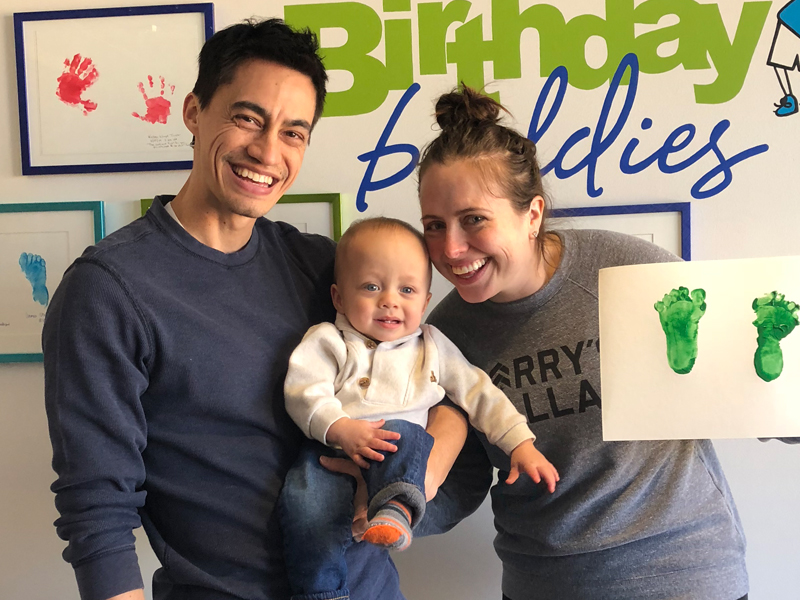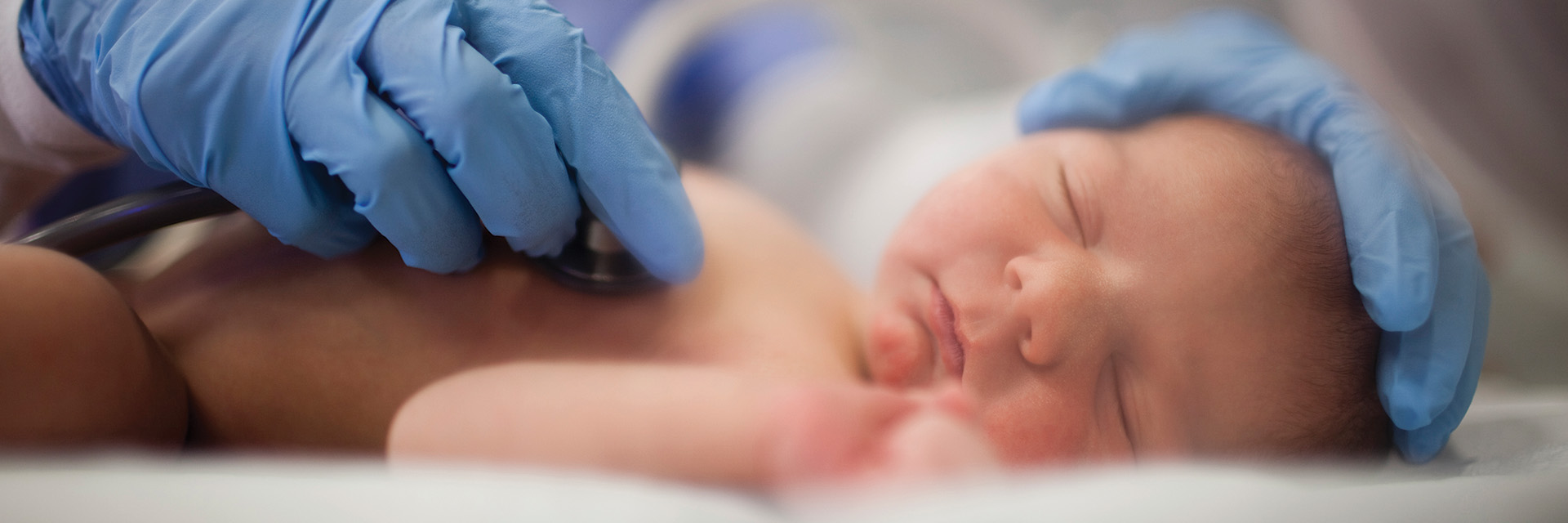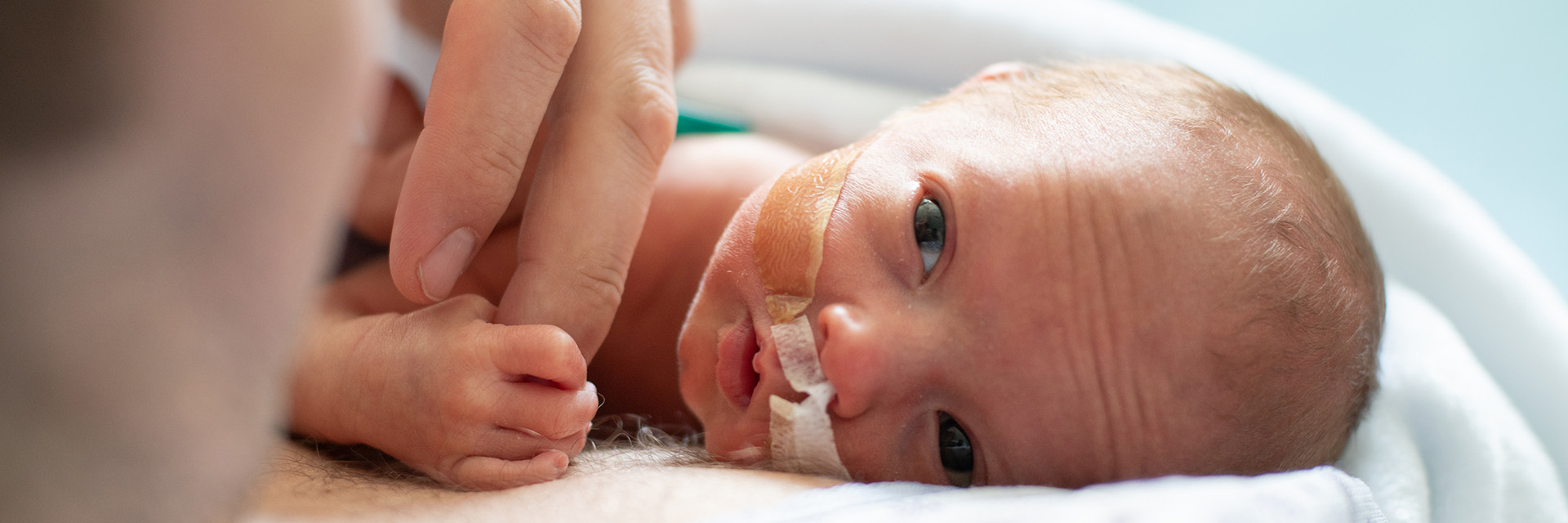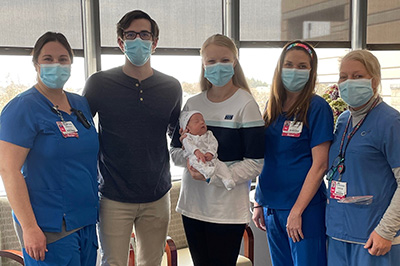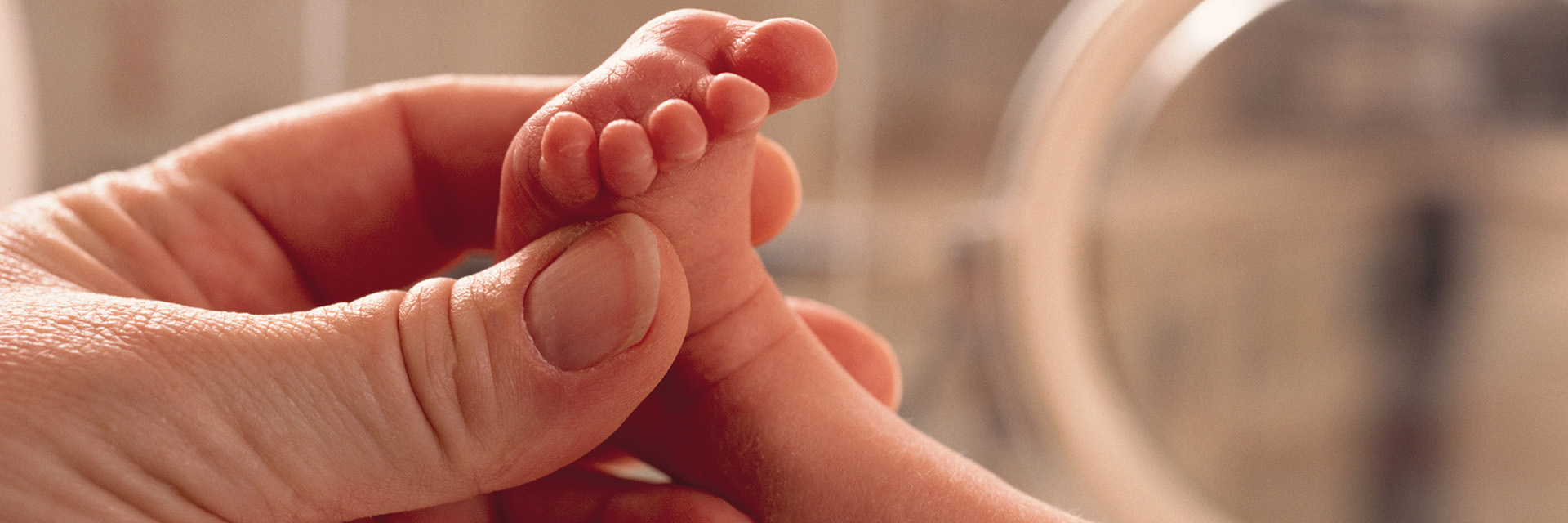-
When can I visit my baby?
By visiting regularly, you will learn what your baby likes and does not like. Read, sing and talk to your baby. Your baby will know your smell and voice quickly. Also feel free to assist with changing diapers, bathing, dressing, feeding, calming, talking to and holding your baby. Find out from your nurse when these things happen during the day and night, so you can be available to do them and learn. Ask questions and talk about your concerns.
-
How will I get information about my baby?
Partner With Your Nurse
Plan of care can be different between each infant, and their different care needs and can change often. Communicate with your bedside nurse to find out if anything has changed with your baby’s condition or care plan since you last spoke. The bedside nurse will provide useful education on how to care for your baby.
Attend the Daily Provider Visits
Each day, your provider will visit your infant to access their condition and make any necessary changes to the plan of care. Ask your nurse if parents are welcome during this time.
-
Who is caring for my baby?
Although you may not want to be away from your baby, know that your baby is receiving quality, compassionate care while in the neonatal intensive care unit (NICU). Your baby’s care team of physicians on the medical staff, nurses and therapists are specially trained to care for sick babies.
Hospital Support Resources
The hospital has additional services to support you and your baby. You are likely to meet some of these individuals during your baby’s stay in the NICU including:
- Care Transition Managers will meet with you to provide assistance, support and referrals for dealing with the stress of having a baby in the NICU. The Care Transition Manager can also assist you with any financial, emotional, or family concerns. For issues of lodging and transportation, they can act as a referral for you while your baby is in the NICU. They also coordinate making the transition from hospital to home as smooth as possible.
- Registered Dieticians monitor what your baby is fed and how well they are growing. These dieticians are specially trained in infant nutrition, including human milk, vitamin/mineral supplements, and infant formulas. They will assist the doctors and nurses in ensuring that your baby has the appropriate diet to meet nutritional needs during their hospitalization and when you’re preparing to go home.
- Chaplains are available to meet with you to offer spiritual and emotional support. Although a chaplain is trained to work with people of all faiths, you may wish to have the chaplain facilitate a visit from a minister of your own tradition. The chaplain is also a resource person who can work with you as you consider baptism, anointing or other spiritual services.
Medical Care Team
The health care professionals you are most likely to meet during your baby’s stay in the NICU include:
- Neonatologists are pediatric doctors on the hospital staff specifically trained to care for sick and premature newborns in a hospital setting. There are a number of neonatologists who rotate through the NICU. They will manage your baby’s care until he/she is discharged. A neonatologist is available 24 hours a day, seven days a week.
- NICU Registered Nurses provide 24-hour bedside care throughout your baby’s hospitalization. These nurses are experienced and have received extensive training to work with sick babies. They are the persons with whom you will have the most contact and the greatest opportunity to discuss your baby’s progress.
- Neonatal Nurse Practitioners are registered nurses who have advanced education and specialized training in working with sick and premature babies. They work under the direction of the neonatologist, can perform many procedures and help direct your baby’s care.
Medical Support Services
The specialists and therapists you are likely to meet during your baby’s stay in the NICU include:
- Occupational Therapists (OT) focus on providing appropriate developmental care for preterm infants. Developmental care includes positioning to help babies remain in a calm state, providing gentle range of motion, touch and vestibular input, as well as parent education. They also provide early intervention for infants that have special needs such as Down Syndrome, spina bifida, or other diagnoses that can cause infants to have developmental delays.
- Respiratory Therapists (RT) in the NICU are trained to take care of babies with breathing problems. It is especially important for them to care for babies in the NICU because premature babies’ lungs are not fully developed. They also provide care to babies that require medical equipment to help them breathe.
- Lactation Consultants (LC) are health care professionals who are experienced in teaching you how to breastfeed your baby. The lactation consultant’s primary role is to provide you with education, assistance, and support while you gain confidence in breastfeeding your baby.
- NICU Palliative Care Team is an interdisciplinary team to support your family should your baby have complex medical needs. The team assists in advanced care planning and care coordination. Ask your medical provider or nurse for more information.
-
What does this diagnosis mean?
We know this time is confusing. The National Association of Neonatal Nurses and the March of Dimes provides comprehensive overviews of common NICU diagnoses, such as apneas, cardiac defects, chest tubes, gastroesophageal reflux, sepsis, respiratory distress and many others, as well as common tests your baby may have in the NICU.
- Read more about common NICU diagnoses
- Information on common tests performed in the NICU
-
How can I help keep my baby safe?
Preventing the Spread of Illnesses
Babies in the NICU can get sick very easily. If you have the sniffles or allergy type symptoms, you may have a viral infection. If this is the case, please stay home and take care of yourself. If you have concerns or questions, feel free to talk to your baby’s nurse.
Preventing Infections
Cleaning your hands is the best way to stop the spread of disease. Before you or any visitors touch your baby, you should wash your hands and forearms with soap and water for at least 15 seconds or use the alcohol hand foam located in the dispensers on the walls in patient rooms and in the hallways. You should clean your hands after using the restroom, before eating, after sneezing or coughing, or any time they are dirty.
Immunizations
A newborn baby’s shots are a way of protecting your child against a variety of diseases that can be prevented.
- Information about immunizations provided by the Texas Department of Health Services
- Information about immunizations provided by the Centers for Disease Control and Prevention
- Information from the March of Dimes about vaccinations
-
Is my baby in pain?
According to the National Association of Neonatal Nurses, infants born sick or premature frequently endure numerous procedures during their stay. Parents and caregivers should routinely try to comfort the infant.
Learn more about infant pain management
-
What screenings are being performed?
There are several screenings that will be performed on your child while they are in the hospital. Early detection is key in preventing later speech and communication disorders.
- Information provided by the March of Dimes about general screening tests for newborns
- Information provided by the March of Dimes about the heart screen
- Information provided by the March of Dimes about the hearing screen
- Information provided by the March of Dimes about the blood screen
-
How can I bond with my baby?
Touching and Holding
At first, touching may be too stimulating for your baby. Babies are comforted by your firm, steady touch. If your baby is very small, you can offer your finger for them to grasp or place their hand in yours. Remember a little goes a long way.
Skin-to-Skin (Kangaroo Care)
By holding your diapered baby on your bare chest, skin-to-skin is a way for you to be close with your baby. Moms and Dads can both do this. It helps regulate your baby’s breathing, helps keep your baby calm and relaxed, and helps the mother increase the amount of milk that she produces. You can change into a hospital gown or wear a button-down shirt to make Kangaroo Care (skin-to-skin) easier. You should plan on allowing plenty of time to hold your baby skin-to-skin.
-
Are there certain things I should do to help?
You may find that with the activity that occurs once your baby is in the NICU, you have trouble knowing what you can and cannot do with your baby. Your baby’s nurse and doctor are the best people to tell you what your baby can tolerate.
Additionally, your baby needs uninterrupted sleep to grow. You can help make sure that your baby is getting good sleep by using a soft voice, keeping the lights low, and letting him/her sleep between his/her feeding times without being disturbed.
-
Texas Health Allen
Texas Health Allen has a Level II NICU to care for your baby after your birth.
Location and Parking
The NICU is located inside The Family Birthplace on the 3rd floor of the main hospital building.
Parent Involvement and Visitation
We realize you may want additional people to offer support during your stay. For this reason, the NICU has an open-access policy for families. Parents are welcome 24 hours a day, and we want you to be part of the care discussions. You are encouraged to spend as much time as you can with your baby. This time will give you a better understanding of your baby’s needs.
Friends and Family Visiting Information
- Parents, grandparents and siblings at least 3 years of age may visit your baby.
- Other visitors age 13 and over are welcome to visit when accompanied by the baby’s parents.
- Big brothers and big sisters are encouraged to visit, but visitation may be restricted for siblings under 16 during RSV and flu season.
- To maintain a quiet environment, we ask that there are only two people at the bedside at one time.
- Guests will be asked to check their cell phones and any bags at the NICU front desk. These items may remain with your guests after check-in or may be placed in available storage compartments in the NICU.
Family Waiting Area
There is a nearby waiting area TVs, couches, internet access, a children’s table and chairs for additional guests.
Staying Overnight
As a courtesy, Texas Health Allen offers boarding rooms to parents of NICU babies to allow them to be near their baby and involved in his/her care. Room availability will be determined by the charge nurse on a day by day basis, based on hospital needs.
To contact the NICU, call 972-747-6465.
-
Texas Health Alliance
Texas Health Alliance has a Level III NICU to care for your baby after your birth.
Location and Parking
The NICU is a closed unit (secure) located on the 4th floor of the hospital. Visitors arriving during daytime hours (6 a.m. to 9 p.m.) should park near the main entrance to the hospital. Visitors who arrive after 9 p.m. should enter the hospital through the Emergency Room entrance.
Parent Involvement and Visitation
We realize you may want additional people to offer support during your stay. For this reason, the NICU is open to parents and families around the clock, except from 6:45 a.m. to 7:15 a.m. and 6:45 p.m. to 7:15 p.m. daily for shift change. We encourage you to be part of your baby’s care discussions and to spend as much time as you can with your baby. This time will give you a better understanding of your baby’s needs.
Friends and Family Visiting Information
- Parents, grandparents and siblings at least 3 years of age may visit your baby.
- Other visitors age 13 and over are welcome to visit when accompanied by the baby’s parents.
- Big brothers and big sisters are encouraged to visit, but visitation may be restricted for siblings during RSV and flu season.
- Parents may bring in visitors of their choosing.
Family Lounge
A nearby waiting area that offers families and visitors Internet access, TVs, couches, vending machines, a children’s table and chairs, and a quiet space for private reflection or consultations with physicians on the medical staff. Lockers are also available at the entrance to the NICU for parents to store belongings.
Books for NICU Babies
Texas Health Alliance has a special program that provides books for parents to read to their infants while in the NICU. The books, located in Winnie’s Wagon, were donated by a girl who stayed in the NICU as a baby. On her first birthday, she donated the books and special wagon to the NICU to make sure all parents have the opportunity to read to their infants.
CPR Training
At discharge, parents will receive a self-teaching CPR video and CPR doll.
Support for Special Circumstances
Prayer beads are offered through Pastoral Services and available from nursing personnel for those times when a little extra reflection and support may be needed. Please ask the nursing personnel about access to prayer beads.
To contact the NICU, call 682-212-3490.
-
Texas Health Arlington Memorial
Texas Health Arlington Memorial has a Level III NICU to care for your baby after your birth.
Location and Parking
The NICU is a closed (secure) unit located on the 1st floor of the hospital by the north entrance. Visitors should park in the east visitors lot.
Parent Involvement and Visitation
We realize you may want additional people to offer support during your stay. For this reason, parents are welcome 24 hours a day except between the hours of 6:30 and 7:30 a.m. and 6:30 and 7:30 p.m. to provide privacy for all families during shift change. We also request that you refrain from visiting/having visitors from 12:30 p.m. to 1:30 p.m. daily to provide a quiet time for newborns.
Friends and Family Visiting Information
Parents may accompany one other guest who is 16 years of age or older at the baby’s bedside for visitation. There must always be one parent with a baby ID wristband on at the bedside to ensure security for all babies in the NICU. To maintain a quiet environment, we ask that there are only two people at the bedside at one time.
Family Lounge
The NICU has a family lounge with Internet access, TVs, couches, a children’s table and chairs, and a private room for consultations with physicians on the medical staff.
-
Texas Health Dallas
-
Texas Health Denton
-
Texas Health Flower Mound
Texas Health Flower Mound has a Level II NICU to care for your baby after your birth.
Location and Parking
The NICU is a closed unit (secure) located on the 3rd floor of the hospital. Visitors arriving during daytime hours should park near the main entrance of the hospital. If arriving at night, visitors should park and enter through the Emergency Room entrance, where you will be escorted to the 3rd floor by our security officer.
Parent Involvement and Visitation
Parents are welcome 24 hours a day, and we encourage you to be part of the care discussions.
Checking On Your Baby
Your baby will be listed in the NICU under the mother’s last name. When calling to check in on the baby, please use this information and the baby’s band identification number to obtain information.
Family Lounges
There is a comfortable waiting area with a coffee station, vending machines, seating, and usb plug access for charging of electronic devices.
Food in the NICU
We encourage parents to leave the unit to eat their meals. You may have a light snack but ask that you eat meals away from the bedside.
Breastmilk Storage
Parents will have the ability to check their milk into the system. Parents can store one bin full of milk in the freezer. Additional milk can be stored at home and brought to the NICU as needed in freezer containers.
Easing the Transition to Home
The NICU provides a room where parents can spend the night with their infant the night prior to discharge. This gives parents the chance to experience caring for their child on their own, with the security of caregivers close by.
-
Texas Health Fort Worth
Texas Health Fort Worth has a Level III NICU to care for your baby after your birth.
Texas Health Fort Worth’s 65 bed NICU cares for over 600 babies every year. Neonatologists and specialists on the medical staff are available 24 hours a day, 7 days a week to care for premature or critically ill babies. Texas Health Fort Worth is connected to Cook Children’s Hospital by skybridge. Moms are able to go back and forth to visit if your baby is admitted to Cook Children’s.
Parents Involvement and Visiting
The NICU welcomes parents and family 24 hours a day. From 6:30 a.m.-7:30 a.m. and 6:30 p.m. -7:30 p.m. we ask that only parents be at the bedside. During this time nurses are changing shifts, and we encourage parents to be part of the care discussions. You are encouraged to spend as much time as you can with your baby to help you better understanding of your baby’s needs.
Friends and Family Visiting Information
- Parents, grandparents and siblings at least 3 years of age may visit your baby in the NICU.
- Other visitors age 13 and over are welcome to visit when accompanied by you.
- To maintain a quiet environment, we ask that there are only two people at the bedside at one time.
Cell Phone Usage
We ask that parents and visitors please respect these guidelines for the safety of our patients:
- Before you scrub, turn your phone to silent or vibrate and place in a plastic bag.
- Please do not remove your phone from the bag when you are visiting your baby because cell phones carry many germs which can infect your baby.
- Please step out of the pod to make or take phone calls and do not remove your phone from the bag.
- Please do not FaceTime or Skype from the bedside, instead, we encourage you to see your baby through the camera in their bassinet.
- If your baby is in the Special Care Nursery, you may accept calls, FaceTime or Skype.
Quiet Time for Bonding
The NICU has Quiet Time from 12 p.m. to 2 p.m. to give parents a time to rest and bond with their babies. This is also a good time to practice kangaroo care.
24/7 On-Site Neonatologist
Our NICU patients will have a neonatologists and neonatal nurse practitioners on the medical staff are on duty throughout the day and night. One of them will talk to you about any changes in your baby’s care. Please refer questions about your baby’s care to the attending physician or nurse practitioner.
Support for Parents
The NICU has the Celia Winn Spaans Family Support Room, which has a family-style sitting area with a TV, refrigerator and microwave. Additionally, Texas Health Fort Worth has a NICU Helping Hands program on campus. This program provides a number of services to assist parents such as:
- Providing parent education literature
- Organizing educational opportunities and craft events for families
- Serving as a resource for parents.
Bead Program for Babies
During your baby’s stay in the NICU, Texas Health Fort Worth has a special program that honors the milestones achieved during a patient’s unique journey. The beads help parents tell their infant’s own story of bravery. For each test or treatment the newborn receives in the NICU, the baby may be eligible for a new bead for their string.
Rooming-In Before Discharge
You may have the opportunity to spend a night or two with your baby in a room that is conveniently located in the NICU. This can help build your confidence before bringing your baby home.
Private Patient Rooms Available
Our Special Care Nursery has private rooms that may be available to you during your stay when your baby reaches certain milestones. Parents can stay overnight with your baby in these rooms.
-
Texas Health Frisco
Texas Health Frisco has a Level II all private, single room NICU.
Parent Involvement and Visitation
The NICU welcomes parents 24 hours a day. You will need to show your baby’s birth ID band and your driver’s license to enter the NICU.
Friends and Family Visiting Information
We realize you may want additional people to offer support during your baby’s NICU stay. For information on family and friends visiting, please speak with your baby’s nurse.
-
Texas Health HEB
Texas Health HEB has a Level III NICU to care for your baby after your baby’s birth.
Texas Health HEB’s 16-bed NICU cares for nearly 230 babies a year. The NICU is staffed by neonatologists on the medical staff at Texas Health HEB and neonatal nurse practitioners who provide care for premature, high-risk and ill infants 24 hours a day, 7 days a week.
Location and Parking
The NICU is a closed (secured) unit located in the Siratt Women’s Center on the first floor of the hospital. Entrance to the Siratt Women’s Center can be accessed through the main entrance of the hospital or through the Emergency Room entrance.
Parent Involvement and Visitation
The NICU has an open-access policy for families and caregivers. Parents are welcome 24 hours a day and we encourage you to be a part of the care discussions.
- After delivery, you and your support person will be given an arm band. This arm band helps verify the infant to the parents. Please keep this arm band until your infant is discharged from the NICU.
- From 6:30 a.m. to 7:30 a.m. and 6:30 p.m. to 7:30 p.m., we ask that only parents be at the bedside during this time for the nurses changing shifts.
- You are encouraged to spend as much time as you can with your baby to help you better understand your baby’s needs.
Family and Friends Visiting Information
- Parents, grandparents, and siblings at least 3 years of age may visit your baby in the NICU.
- Other visitors age 13 and over are welcome to visit when accompanied by you.
- To maintain a quiet environment, we ask that there are only two people at the bedside at one time.
- Visitation may be restricted due to Flu, RSV, or COVID rates in the community.
- If you feel sick or have a fever we ask that you do not visit to protect your Any person who has a temperature over 100F must be fever free for 24 hours without the use of fever reducing medication before entering the NICU.
- Guests will be asked to place their cell phones in a plastic bag and place any additional bags in the NICU parent lockers.
- Near the NICU parent lockers there is a corner space for parents and siblings. Information regarding the SENSE program, children’s books to read to your baby, and coloring materials for siblings are available.
Cell Phone Usage
We ask that parents and visitors please respect these guidelines for the safety of our patients:
- Before you scrub, turn your cell phone to silent or vibrate and place it in the plastic bag
- Please do not remove your phone from the bag when you are visiting your baby because cell phones carry many germs which can infect your baby
- Please step out of the pod to make or take any phone calls
- Please do not FaceTime or Skype from the bedside. Instead, we encourage you to see your baby through the camera in their bed.
Family Lounge and Restroom
There is a family lounge with internet access, TVs, chairs, and a quiet space for private reflection or consultations. There is also a guest restroom outside of the NICU area.
Checking on Your Baby
Your baby will be listed in the NICU under the mother’s last name. When calling to check in on your baby, please use the last name and the baby’s identification band number to obtain information. Only people listed on the release of information consent (outside of parents) will be able to get information on your baby.
Breastmilk Storage
Parents will have the availability to check breastmilk into the MOMs system. Parents can store two bins full of milk in the freezer. Additional milk can be stored at home and brought to the NICU as needed. When bringing frozen milk up to the NICU, please ensure that a cooler is used to keep the milk frozen during transport.
Easing the Transition to Home
The NICU provides a room where parents can spend the night with their infant the night prior to discharge. This gives parents the chance to experience caring for their child on their own, with the security of caregivers close by.
CPR Class
Prior to discharge, parents are encouraged to sign up for an in-person CPR class. If parents are unable to attend an in-person CPR class, they will watch the CPR infant videos either in the unit or rooming-in room.
-
Texas Health Plano
-
Texas Health Rockwall
-
Texas Health Southwest
Texas Health Southwest Fort Worth has a Level III NICU to care for your baby after your birth.
Location and Parking
The NICU is a closed unit (secure) located on the 2nd floor of the Pease Tower. Visitors arriving during daytime hours (7 a.m. to 10 p.m.) should park near the front atrium entrance. If arriving at night (10 p.m. to 7 a.m.), visitors should park and enter through the Emergency Room entrance.
Parent Involvement and Visitation
We realize you may want additional people to offer support during your stay. For this reason, the NICU has an open-access policy for families. Parents are welcome 24 hours a day, and we encourage you to be part of the care discussions.
Friends and Family Visiting Information
- Parents, grandparents and siblings at least 3 years of age may visit your baby.
- Other visitors age 13 and over are welcome to visit when accompanied by the baby’s parent.
- Big brothers and big sisters are encouraged to visit, but visitation may be restricted for siblings during RSV and flu season.
- To maintain a quiet environment, we ask that there are only two people at the bedside at one time.
- There are storage lockers located within your NICU for additional belongings.
Checking On Your Baby
Your baby will be listed in the NICU under the mother’s last name. When calling to check in on the baby, please use this information and the baby’s band identification number to obtain information.
Family Lounges
There are two waiting areas on the 2nd floor offer a coffee/water station, comfortable seating and phone charging stations (available in the atrium waiting area only).
Food in the NICU
We encourage parents to leave the unit to eat their meals. You may have a light snack but ask that you eat meals away from the bedside.
Breastmilk Storage
Parents will have the ability to check their milk into the system. Parents can store two bins full of milk in the freezer. Additional milk can be stored at home and brought to the NICU as needed in freezer containers.
Easing the Transition to Home
The NICU provides a room where parents can spend the night with their infant the night prior to discharge. This gives parents the chance to experience caring for their child on their own, with the security of caregivers close by.

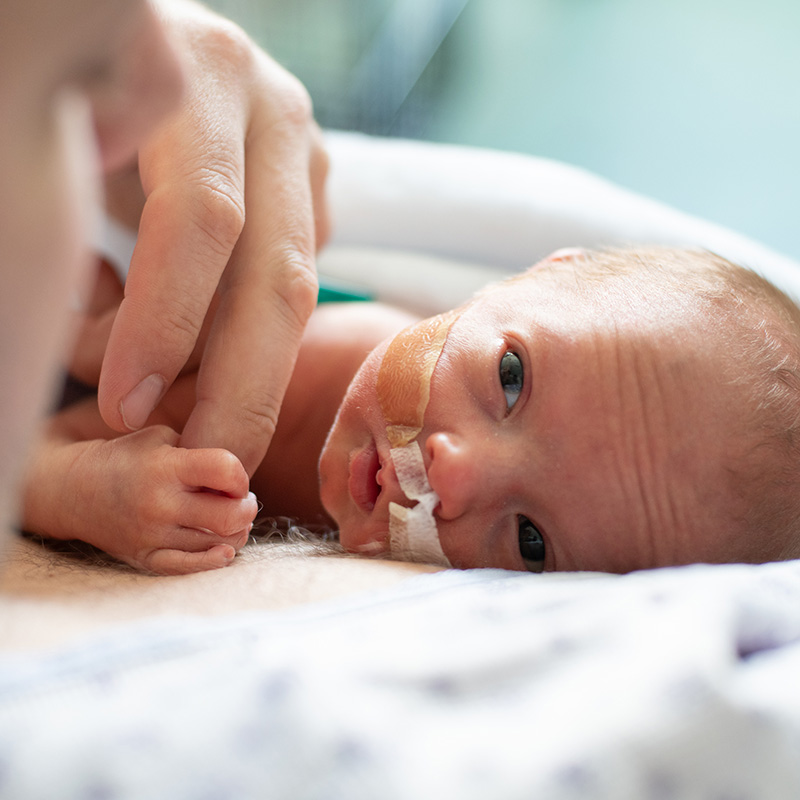
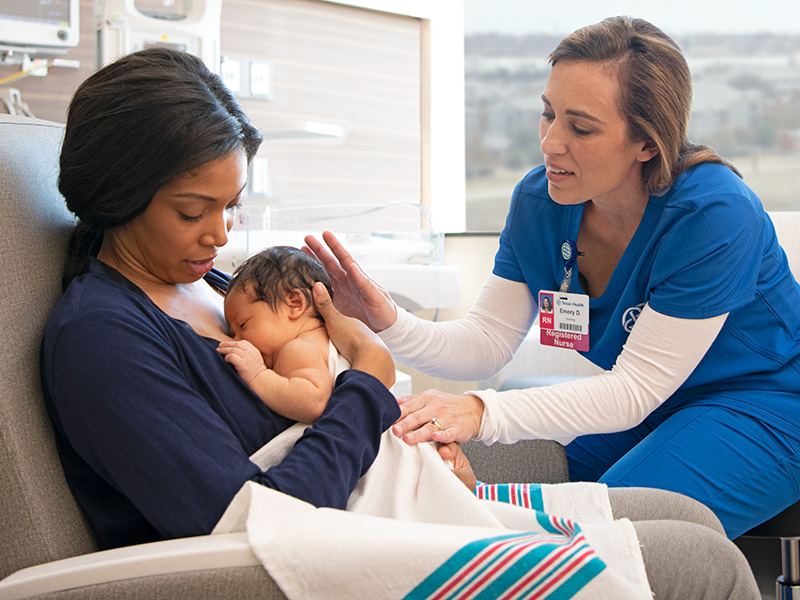
-
Goals for Your Baby Before They Are Discharged
Typically, your baby is close to going home when they can:
- Stay warm on his/her own
- Breathe normally and maintain a normal heart rate
- Breathe room air or be stable on home oxygen
- Complete all feedings for 48 hours from breast or bottle
- Consistently gain weight (may not apply for shorter stays, ask your nurse)
-
Paperwork and Records
Discharge Paperwork and Medical Records
You should receive a copy of the baby’s discharge summary when your baby leaves the NICU. Make sure to keep the discharge summary in your diaper bag so that you have it for all doctor’s appointments.
To request your baby’s medical record or if you need additional information please contact the Health Information Services Department.
Birth Certificate
To obtain copies of your child’s birth certificate or social security information, you can contact the appropriate government agency.
Get more information on requesting your child's birth certificate or social security information.
-
Questions to Consider
When the above goals are being met, it’s time to start thinking about the following:
- Do you have the supplies you need?
- Do you feel comfortable feeding your baby?
- Do you know how to install and operate your car seat?
- Will it be possible to room-in with your baby the night prior to going home?
-
Learn to Use Equipment
Some babies require special equipment when they go home. The neonatologist will determine if your baby requires any of this equipment at home. The Care Transition Manager will coordinate with the home equipment company to set up a session to teach you how to use it. Consider buying baby clothes that can comfortably fit any equipment that your baby may be using.
-
Car Seat Test
Car Seat Test in the NICU
Some babies may have a car seat test prior to going home. This test is done to make sure that your baby is breathing well while sitting in his car seat for a certain amount of time. Should you have any questions about car seat safety or would like to have some help with the installation of the car seat, please speak with your baby’s nurse.
Car Seat Installation Appointments
Texas Health offers Car Seat Safety Check Appointments which can assist you with making sure your car seat is correctly installed. Make a car seat installation appointment online by calling 1-877-THR-Well.
-
Preparing Baby's Space at Home
Talk with your baby’s nurse about preparing a place for baby at home. Some typical baby shower gifts are not safe for a baby. Items to avoid include:
- Extra padding or inserts for your baby’s car seat
- Cushions that are sold to help keep your baby in a certain position in his/her bed
- Bumper pads for the baby’s crib at home
- Home monitors that promise to reduce the risk of SIDS
- Many of the same kind of bottle or nipple. Your baby may not eat well from a particular bottle or nipple style at home.
-
Safe Sleep
According to the American Academy of Pediatrics, the best place for your baby to sleep is in a bassinet or crib. If you have multiples (twins, triplets or more), put each baby in his own bassinet or crib. Follow this information based from the State of Texas Department of Family and Protective Services Room to Breathe Initiative:
Alone in a Crib
- No adults, children or pets with your baby
- No blankets, pillows, bumpers or toys
Back With No Blankets
- Sleep on the back
- Not on their side or stomach
Cool Temperature in a Crib
- Sleep in a crib with a fitted sheet on a firm mattress
- Dress your baby lightly, and if needed use a sleep sack for warmth
- Keep the room at a cool temperature
Sleepy or Smokey
- Do not fall asleep with your baby
- If sleepy, put your baby back in the crib
- Never smoke around or expose your baby to second-hand smoke
For more information about keeping your infant safe while sleeping, visit the March of Dimes.
